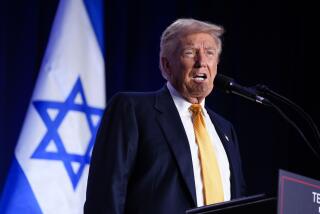Gore Urges Repeal of Patriot Act
In a blistering critique, former Vice President Al Gore accused President Bush on Sunday of eroding personal freedoms and weakening the nation’s security through “mass violations of civil liberties” in the war on terrorism.
“Where civil liberties are concerned, they have taken us much farther down the road to an intrusive, ‘Big Brother’-style government -- toward the dangers prophesized by George Orwell in his book ‘1984’ -- than anyone ever thought would have been possible in the United States,” Gore told an enthusiastic crowd of 3,000 that filled DAR Constitution Hall.
Gore charged that many of the domestic security policies the administration has pursued since the Sept. 11 terrorist attacks have actually weakened the nation’s security by distracting attention from the most urgent threats.
He called for the repeal of the USA Patriot Act, legislation passed by Congress shortly after the attacks that gave federal law enforcement officials new authority to monitor and pursue suspected terrorists.
“These constant violations of civil liberties promote the false impression that those violations are necessary in order for them to take every precaution against another terrorist attack,” Gore said. “But the simple truth is that the vast majority of these violations have not benefited our security at all; in fact, they have hurt the effort to improve our security.”
Bush’s reelection campaign referred calls on the speech to the Republican National Committee. RNC officials did not return a call seeking comment.
But in a series of speeches this year, Atty. Gen. John Ashcroft defended the administration’s actions as being respectful of civil liberties and effective in disrupting potential terrorist attacks.
“The Patriot Act,” Ashcroft said this summer, “gives us the technological tools to anticipate, adapt and outthink our terrorist enemy.”
Republican strategist Cliff May, president of the Foundation for Defense of Democracies, a Washington-based research organization that examines terror-related issues, said Gore’s critique would have been more persuasive if, rather than primarily criticizing Bush, he had also discussed how the Clinton administration could have battled terrorism more successfully during the 1990s.
May also predicted that Gore and other Democrats would get a cool reception from voters in 2004 if they campaigned against the Patriot Act and other steps taken by Bush to fight terrorism since the 2001 attacks.
“If the Patriot Act is what the election of 2004 revolves around, the Democrats are not likely to do very well, because I don’t think most Americans think they have lost constitutional rights,” May said. “There is a reason we haven’t been attacked on American soil since 2001, and I think the Patriot Act is part of that.”
Virtually all of the 2004 Democratic presidential candidates have criticized Bush’s civil liberties record, but Gore’s remarks are among the sharpest attacks that any Democrat has offered on the issue. Gore’s comments follow an equally confrontational speech in August, when he accused Bush of misleading the country on the war in Iraq and a wide array of domestic issues.
Like that speech, Sunday’s address was sponsored by MoveOn.org, a liberal advocacy group. It was cosponsored by the American Constitution Society, a liberal group established to offset the influence in law schools of the Federalist Society, an organization of conservative lawyers.
Gore, the Democratic presidential nominee in 2000, received a sustained standing ovation when he arrived and several more throughout the speech.
Intermittent chants of “Run, Al, run” bubbled up from the crowd, but Gore, who took himself out of the Democratic race in December, waved them off without responding. He did not take questions from reporters after the address.
In the speech, Gore charged that the Bush administration “had turned the fundamental presumption of our democracy on its head” by seeking to withhold information about its own activities, even while acquiring ever more information about the activities of private citizens.
Gore said Bush was frustrating the public’s right to information about its government by resisting independent and congressional investigations into the Sept. 11 attacks; by instructing federal agencies to resist requests for documents under the federal Freedom of Information Act; and by refusing to disclose details about individuals of Arab descent detained after the attacks.
At the same time, Gore noted, the administration has pursued new authority to investigate Americans it considers security risks by monitoring their e-mail and Internet activity, their conversations with lawyers, and even the lists of library books they have checked out.
Linking his new critique to his earlier criticism of the war in Iraq, Gore declared: “It makes no more sense to launch an assault on our civil liberties as the best way to get at terrorists than it did to launch an invasion of Iraq as the best way to get at Osama bin Laden.”
Gore said Bush should renounce his policy, which has been used twice, of indefinitely detaining American citizens that the president designates “enemy combatants.”
Gore also said the suspected Al Qaeda and Taliban members held at the U.S. Naval Base at Guantanamo Bay, Cuba, should be allowed to petition for status as prisoners of war, and he argued that Congress should authorize any military tribunals used against suspected terrorists. Bush has asserted the right to try suspected terrorists before such tribunals but has not yet done so.
Most important, Gore said Congress should repeal the Patriot Act, which passed the Senate, 98 to 1, shortly after the attacks on the Pentagon and the World Trade Center. Gore equated the law with the resolution that ultimately authorized the war in Vietnam.
“I believe that the Patriot Act has turned out to be, on balance, a terrible mistake, and that it became a kind of Tonkin Gulf Resolution conferring Congress’ blessing for this president’s assault on civil liberties,” Gore charged.
More to Read
Get the L.A. Times Politics newsletter
Deeply reported insights into legislation, politics and policy from Sacramento, Washington and beyond. In your inbox three times per week.
You may occasionally receive promotional content from the Los Angeles Times.










